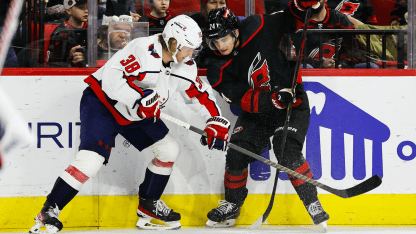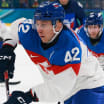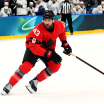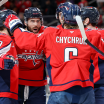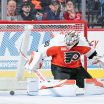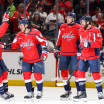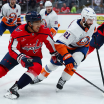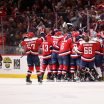Squeezing Out Sparks – The NHL regular season is a marathon, and the end is in sight. Down to their last seven games, the Caps are in Carolina tonight to close out their season’s series with the Hurricanes, and they’re seeking to shake the shackles of a four-game slide (0-3-1) that has put their playoff hopes in a state of precariousness.
Washington has scored only six goals over the life of its losing streak, three of them on the power play. The Caps have been outscored 15-3 at 5-on-5 in those games, and the Caps’ coaching staff has tried various line combinations in an effort to stimulate scoring amongst the group.
All they can do is keep trying, the rest is up to the 18 skaters on a given night.
“Honestly, the most challenging part of the season for us as coaches has been finding combinations that have fit and been able to generate chemistry, and then stick with that,” says Caps’ coach Spencer Carbery. “It's just been so volatile with consistency between lines consistency between your players. Like [Connor McMichael and Aliaksei Protas] had a great run with Anthony Mantha, and then you lose [Mantha vis trade], and their game has fluctuated from a production standpoint. We've had a lot of solid play [from them], but the production part is what we've searched for all year.
“It’s not ideal having to move lines around all the time. It's just a product of our group, and having to find a combination that works. Remember we went to [Alex Ovechkin] and [Hendrix] Lapierre, which was running pretty hot for a little bit, and then it sort of went dry for a while. So then we moved [McMichael] with [Ovechkin], and they had a good run.
“So that's been a real challenge, but hopefully tonight – no matter the lines and the way that they shake out – is guys stepping up and making some big plays and playing just a hard [game]. It's going to be a really difficult game; hard and physical, but understand that we've got to be able to advance pucks and break their pressure.”
Start Me Up – Over the course of the previous 75 games, the Caps have had two long stretches of successful and consistent hockey. From Oct. 25 through Dec. 23, they posted a 16-6-4 mark (.692 points percentage) that lifted them into playoff contention, and from Feb. 10-March 30 they went 14-7-3, a stretch that elevated them back into the postseason picture after a midseason lull dropped them down the standings for two and a half months.
Those two hot spells cover 50 of Washington’s 75 games to date. The other stretches are a 1-3-1 start to the season in the first five contests of the regular season, a rugged run of 5-11-2 from Dec. 27-Feb. 8, and their 0-2-0 start to April. The good spells total 30-13-7 (.670) and the rough patches add up to 6-16-3 (.300).
One of the common characteristics of the dry spells is a lack of scoring, and a lot of time spent playing from behind and chasing the scoreboard. While the Caps have shown the necessary resilience and character to rebound from deficits to pull points and/or win games on a number of occasions this season, they are – like most teams – much better off when they can play with and endeavor to protect a lead.
When they lead after 20 minutes of play, the Caps are 17-2-0 this season. When they’re tied after the first period, they’re 13-4-4. So they’re 30-6-4 in the 40 games in which they’ve been either even or leading after one period of play. The problem is they haven’t had enough of those good starts that result in early leads and playing from ahead.
And during the aforementioned stretches adding up to 25 games in which they’ve struggled this season, they’ve been outscored by a combined total of 30-15 in the first period. On the season, Washington has been outscored by a combined total of 76-57 in the first period, a minus-19 goal differential, most of which comes from that cluster of 25 games.
It seems as though the Caps could help themselves quite a bit by generating better starts on a more consistent basis. They’ve been excellent when playing with a lead throughout the season, and of course that’s true for most teams.
“It is and we don't have any Cookie Monsters, so to speak,” says Caps’ winger Max Pacioretty. We understand that when we're in a position to hang onto a lead, we don't have guys cheating to try and just get their points, and that is the big difference. I've been on teams where that's not the case.
“Our team plays to win. And we've seen that; when we go down, then that's when we start taking chances, and that's why our goal differential is what it is. We start to take chances, and then either we come back, or maybe things get out of hand. But when we do have a lead, we have enough veterans in this group and in this room to know that we can't take chances, we can't cheat for offense. We’ve got to try and lock it down defensively, while still doing the right things, putting the puck in areas to get it back. But we definitely don't take as many chances, and that's a good thing, especially this time of year.”
As they head into tonight’s game against the Canes, the Caps find themselves in the midst of a first-period funk. They’ve only gone to the room with a lead once in their last 13 games, and they’ve been outscored 14-5 in the first 20 minutes of those games.
On Thursday night in Washington, the Caps played a strong first period, only to go to intermission down 2-0 in what would become a 4-1 loss to Pittsburgh.
“It’s interesting, because I’ve looked at that and I’ve looked at some of our starts, and I find that it’s a bit of a mixed bag,” says Carbery. “Sometimes we start – like the other night [in Buffalo] – really good start, we get a lead, and then it sort of dissipates as that game goes along, and our game sort of steadily declined.
“When I step back, I don’t look at us as a poor starting team. I think we’ve had some moments where our starts haven’t been great, but I also have liked our starts at certain points of the year. Our overall goal differential is nowhere near where we would like it to be. Is there a reason for that, specific to us trailing in games? And it’s probably to the point that I haven’t done a very good job of articulating, of when we get into these games where we’re trailing, and then it becomes a track meet; it’s just not conducive to our style of play.
“When we are pressing for offense and trying to make something happen offensively, to score because we’re trailing in the game – whether that’s in the second period or the third period – that’s where I feel like we’ve gotten into some trouble, and where we’ll give up the odd man rush, or the breakaway, or the 2-on-1. And maybe it’s a really good chance for us on the front end of us attacking, we’re looking for that equalizer, and then all of a sudden it’s going the other way, and now a 2-1 game turns into 3-1."
Goal differential is no longer an important metric (it was once used as a tiebreaker for determining playoff teams), though drilling down on it can provide some insight and illumination. But ultimately, a 2-1 regulation loss is the same as a 7-2 regulation loss. It’s a game off the schedule, and one in which your team did not collect any points. Over the course of an 82-game schedule, teams that minimize the number of such nights tend to make the playoffs. Winning 50 games by 2-1 scores and losing the other 32 contests by three goals of more would result in an ugly goal differential, but who cares? That’s a 100-point team, and no team has missed the Stanley Cup Playoffs with a 100-point season.
“I do think there’s merit to that,” says Carbery. “When we get down in a game, and it becomes that back and forth, that’s when that goal differential has escalated. But at the same time, like I’ve said all year, those numbers, our analytics, it doesn’t matter this time of year. This time of year, the only thing that matters is two points. And we’re right there; and we’re fighting and scratching and clawing, and that’s what this group has done all year long. We’ve found ways to win games, even when people maybe didn’t think we would, or when people have counted us out, or when it didn’t look like we would be on the right side of [certain] games.
“And we’re going to be tested in these last few games. But it’s the best time of year to be playing meaningful hockey, and try to find our way in.”
In The Nets – Darcy Kuemper starts for Washington tonight, making his first start in exactly two weeks, since he faced the Hurricanes in the District on March 22. Kuemper did make a relief appearance in Tuesday’s loss to the Sabres in Buffalo, playing the final 14:19 and stopping all four shots he faced in that span.
In Washington’s last 22 games, Kuemper has had four appearances totaling 174 minutes while Charlie Lindgren has had 20 appearances totaling 1,156 minutes.
Lifetime against Carolina, Kuemper is 2-5-1 with a 3.53 GAA and an .891 save pct. in 10 appearances (nine starts).
For the Canes, we’re expecting to see Pyotr Kochetkov in goal tonight. Since he was in net for the 7-6 shootout loss to the Caps in Washington two weeks ago, Kochetkov has stopped 44 of 46 shots while winning each of his two starts over that span.
Most recently, Kochetkov blanked the Canadiens in Montreal on 26 shots this past Saturday night. Lifetime against the Capitals, he is 1-0-2 with a 2.85 GAA and an .857 save pct. in three appearances, all starts.
[Hat tip to the estimable Carter Myers for many of the stats contained in this report.]
All Lined Up – No morning skate for either side today, so here’s how the Caps and the Hurricanes looked in their Thursday night games:
WASHINGTON
Forwards
8-Ovechkin, 24-McMichael, 43-Wilson
21-Protas, 17-Strome, 63-Miroshnichenko
67-Pacioretty, 29-Lapierre, 15-Milano
47-Malenstyn, 26-Dowd, 23-Sgarbossa
Defensemen
42-Fehervary, 74-Carlson
38-Sandin, 3-Jensen
27-Alexeyev, 57-van Riemsdyk
Goaltenders
35-Kuemper
79-Lindgren
Injured/Out
19-Backstrom (lower body)
25-Bear (NHL/NHLPA Player Assistance Program)
77-Oshie (upper body)
Scratches
2-Iorio
31-Shepard
45-Phillips
96-Aubé-Kubel
CAROLINA
Forwards
59-Guentzel, 20-Aho, 24-Jarvis
48-Martinook, 92-Kuznetsov, 88-Necas
37-Svechnikov, 11-Staal, 86-Teravainen
23-Noesen, 18-Drury, 71-Fast
Defensemen
74-Slavin, 8-Burns
76-Skjei, 22-Pesce
7-Orlov, 5-Chatfield
Goaltenders
52-Kochetkov
31-Andersen
Injured/Out
32-Raanta (lower body)
Scratches
28-Lemieux
41-Martin
77-DeAngelo
82-Kotkaniemi

